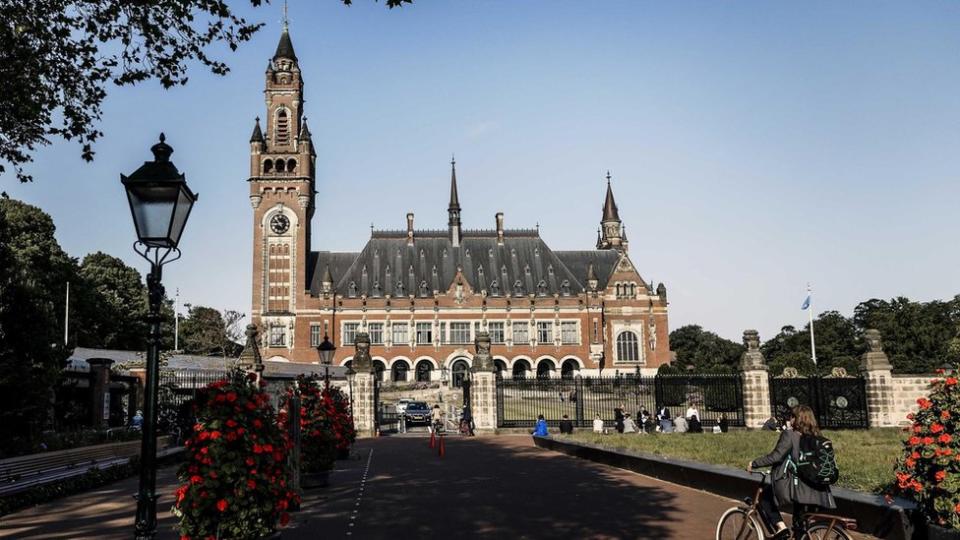The International Court of Justice (ICJ) is expected to rule on a proposal by South Africa to order Israel to stop its military offensive in Rafah. It is part of an ongoing case that began in December 2023, alleging that Israel is committing genocide against Palestinians in Gaza.
Israel rejects the genocide claim as “baseless”.
What is the International Court of Justice?
The ICJ is the highest court of the United Nations (UN).
Based in The Hague, Netherlands, it was created after the Second World War to resolve disputes between states.
It also issues advisory opinions on legal issues, which is what it is asked to do with Israel.
Unlike the International Criminal Court (ICC), the ICJ cannot prosecute individuals for the most serious crimes, such as genocide.
But his views carry weight with the UN and other international institutions.

What is genocide and what is the case against Israel?
South Africa claims that Israel is committing genocide against Palestinians, following the Hamas attack on October 7.
Hundreds of Hamas gunmen crossed the Gaza Strip into southern Israel, killing around 1,200 people, mostly civilians, and taking 252 hostages back to Gaza.
Since Israel launched its military campaign against Hamas in response, more than 35,800 people have been killed in Gaza, according to the Hamas-run Ministry of Health.
Evidence presented by South Africa states that Israel’s “acts and omissions” “are genocidal in character because they are intended to bring about the destruction of a substantial part of the Palestinian national, racial and ethnic group.”
This describes what Israel is actively doing, such as carrying out airstrikes, and what it is allegedly not doing, such as, according to South Africa, preventing harm to civilians.
The claim also highlights Israeli public rhetoric, including comments from Prime Minister Benjamin Netanyahu, as evidence of “genocidal intent.”
According to international law, Genocide is defined as the commission of one or more acts with the intent to destroy, in whole or in part, a national, ethnic, racial or religious group.
These acts are:
-
kill or cause serious physical or mental harm to group members
-
deliberately inflicting on the group living conditions calculated to bring about its physical destruction, in whole or in part
-
impose measures designed to prevent births within the group
-
forcibly transfer children from the group to another group
How has Israel responded to allegations of genocide?
Israel strongly rejected South Africa’s claim.
Netanyahu said: “It was not us who committed the genocide, it was Hamas.
“If he could, he would kill us all.
“In contrast, the IDF [Israel Defense Forces] is acting as morally as possible.”
Israel’s military says it takes a series of measures to avoid civilian casualties.
These included:
-
airdrop leaflets warning of imminent attacks
-
calling civilians’ phones to urge them to leave targeted buildings
-
abort some attacks when civilians are in the way
The Israeli government has repeatedly stated that its intention is to destroy Hamas and not the Palestinian people. It claims it will ignore any court order to stop its offensive on Rafah or elsewhere in Gaza.
What did the court decide and when will there be a final verdict?
On January 26, 2024, the court decided on a series of provisional measures which South Africa asked him to take against Israel.
The main request was that the court order Israel to immediately suspend operations in Gaza, but the court did not confirm this.
However, he instructed Israel to prevent its military from committing acts that could be considered genocidal, to prevent and punish incitement to genocide and to allow humanitarian assistance to the people of Gaza.
The court also ruled that it had the legal right to pursue the genocide case. The court’s president at the time, Joan Donoghue, told the BBC in April that the ICJ did not rule that there was a plausible case of genocide, but rather that Palestinians had the right to be protected from genocide.
A final verdict in the case could take several years.
The rulings are legally binding on countries that formally accept the ICJ – including Israel and South Africa – but in practice they are unenforceable by the court.
In 2022, the ICJ ordered Russia to “immediately suspend military operations” in Ukraine – but the order was ignored.
Why did South Africa open the case?
South Africa has strongly criticized Israel’s military operation in Gaza.
And as a signatory of the 1948 UN Genocide Conventionhas an obligation to act, he says.
The ruling African National Congress also has a long history of solidarity with the Palestinian cause.
He sees parallels with his fight against apartheid – a policy of racial segregation and discrimination applied by the white minority government in South Africa against the country’s black majority, until the first democratic elections in 1994.
The country condemned the October 7 attacks and called for the release of the hostages.
“Our opposition to the ongoing massacre of the people of Gaza has led us, as a country, to approach the ICJ,” said President Cyril Ramaphosa. “As a people who have tasted the bitter fruits of dispossession, discrimination, racism and state-sponsored violence, we are confident that we will remain on the right side of history.”
Correction 13 February: This article incorrectly reported that around 1,300 people had been killed following the 7 October attack carried out by Hamas. This was based on counts of those who later died from their injuries, plus the number of over 1,200. The article has been changed to now refer to around 1,200 deaths, a number that includes these deaths and which Israel says is not definitive.
Additional reporting by Damian Zane.


































